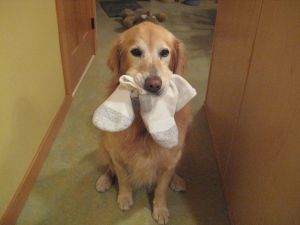First posted on Book View Cafe 4/18/2015 at http://bookviewcafe.com/blog/2015/04/18/our-first-rescueshelter-dog-part-3/
Bear Has Big Pawprints to Fill.
I just got a Facebook notice—Worf’s birthday. Our beloved Golden Retriever, who died last summer, would have been 15 this week. He still has his own Facebook page, where the many students he helped on test day with his “doggly mojo” still post memories. He had that “Golden grin” that seemed to spread happiness, and was our constant companion on hikes until his back legs gave out. Even on laundry day, he was eager to please (or steal a sock or two).
Some of you who’ve read about our recent adoption of Bear (who was relocated from a “high-kill rate” shelter in Idaho by our local group Happy Tails) have asked for an update. I’m happy to report that Bear has settled in as a member of the family. He whirls in joy when we get ready to take him out for hikes or runs with the bikes. Even our formerly-terrified cats follow him around the yard, and when he’s lying down they sniff him and allow nose-to-nose greetings. Bear remains a mellow fellow, polite with other dogs on the trail or occasional visit to dog parks—when an overly aggressive dog won’t back off, Bear puts his paw on the dog’s head to hold him down, as if saying, “Okay, enough, Dude?”
 But, of course, Bear can’t fill those vacant pawprints Worf left behind, and it’s unfair to expect him to do so, or even to have the same temperament that made Worf so easy to live with and care for. Naturally, since Bear is only about two years old, he has a lot more energy to burn off, but part of it may be that he’s part black Chow and… something. Everyone we meet suggests different possibilities for his breed mix, and our vet thinks he’s possibly a cross between black Chow and Golden Retriever. What we’ve discovered is that he is very smart, even a bit sly about dodging “the rules,” and restless if we’re not interacting with him. So we’ve had to adjust our expectations and ways to keep him happy when we can’t be entertaining or exercising him.
But, of course, Bear can’t fill those vacant pawprints Worf left behind, and it’s unfair to expect him to do so, or even to have the same temperament that made Worf so easy to live with and care for. Naturally, since Bear is only about two years old, he has a lot more energy to burn off, but part of it may be that he’s part black Chow and… something. Everyone we meet suggests different possibilities for his breed mix, and our vet thinks he’s possibly a cross between black Chow and Golden Retriever. What we’ve discovered is that he is very smart, even a bit sly about dodging “the rules,” and restless if we’re not interacting with him. So we’ve had to adjust our expectations and ways to keep him happy when we can’t be entertaining or exercising him.
Doranna Durgin, in her Book View Café blog “Gone to the Dogs” of February 2, 2015–http://bookviewcafe.com/blog/2015/02/23/gone-to-the-dogs/ — presents a good discussion of issues surrounding “rescue dogs” and “breeder dogs,” and some of these have come into play with us. Though intellectually knowing that Bear wasn’t a Golden like Worf (and Thor’s previous dogs), somehow I subconsciously expected a “replacement” who would be happy with the same level of interaction. Bear, as he has settled in and become secure, is revealing a more restless nature that sometimes gets him into trouble. Although we take him on daily hikes or runs with the bikes, he sometimes wants more.
He really tests the fencing in our large back yard, and we’ve had to keep improving it (I’m trying to save some of my flower beds from his wild whirling and digging episodes, as well as keep him contained). While we were gone on vacation recently, we had an experienced housesitter who took him on outings every day, and yet while she was gone shopping, he somehow escaped and was picked up by Animal Control, so we had to bail him out. We beefed up the fencing again, but a couple weeks later, while I walked to the store for half an hour, he apparently popped the driveway gate open. I discovered him wandering the street when I returned home, avoiding the attempts of neighbors to catch him by the collar. Now we have double latches on the gate.
 From the start, Thor has been taking him to training classes, and he clearly adores his human “alpha dog,” but Bear can be headstrong when he doesn’t want to obey a command. So we’re still working on finding the right balance for all of us.
From the start, Thor has been taking him to training classes, and he clearly adores his human “alpha dog,” but Bear can be headstrong when he doesn’t want to obey a command. So we’re still working on finding the right balance for all of us.
Bear does melt you when he gives you his sweet, soulful gaze, and we’re really happy that our boy didn’t end up euthanized. Watching him leap and whirl around the yard after a ball, or race along the forest and mountain trails, lets us share his pure joy in life. As with any adoption, perhaps, it’s our job to adjust our expectations and let the mystery of his origins remain just that—part of the mystery of anyone who enters our lives and challenges our preconceptions.
